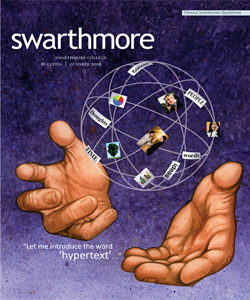Doing Mexican Time
As the Mexicans say, you don’t really know a place until you know its jail.
We first came to San Miguel de Allende six years ago, on a driving vacation through Mexico’s central highlands. My wife, Teresa Nicholas ’76, and I stopped for less than 24 hours on that first visit, but we were sufficiently taken with the picturesque setting, colonial architecture, and vibrant arts scene that we decided to quit our jobs in book publishing and move here. It would be in San Miguel, we decided, that we would realize our much-discussed but long-postponed plans to become writers. Over the years, we bought a little house on the grounds of an old hacienda and worked on our writing projects. We learned Spanish, and I was a volunteer English teacher at a nearby school.
Then one December morning, I’m driving out of a parking lot in the center of town. Traffic is heavy, and a taxi stops to let me make a left-hand turn. But as I ease past the cab, I’m struck by a police motorcycle speeding by without siren or lights.
The young policeman is thrown to the ground but suffers only a minor cut to the bridge of his nose and an injury to the tip of his right pinky finger. My car is impounded, and I have to go to the public prosecutor’s office to give a statement. I’m not overly concerned, since I wasn’t doing anything illegal or imprudent, and it was impossible to see the motorcycle until it appeared on top of my hood. But the policeman’s declaration contradicts my own, especially concerning his speed and our positions at the moment of impact, and the public prosecutor finds me at fault. My insurance company pays $100 to repair the motorcycle and another $750 for the injury to the policeman’s pinky. I pay to have my car fixed, since the damage is less than the deductible on my policy.
In the United States, that would have been the end of the matter. But the policeman is claiming that his pinky is permanently bent. And under Mexican law, causing physical harm to another person isn’t just a civil issue, it’s a crime. So my case drags through the courts for 10 tense months, until a hearing is finally set before a judge. The problem is that the insurance company’s lawyers don’t think to notify me. So about a week after I fail to appear, a man comes to our front gate with a warrant for my arrest.
Accompanied by one of the insurer’s lawyers, I go to the public prosecutor’s office and turn myself in. A guard takes me to the massive state prison next door and, in a cramped room off a loading dock, tells me to take off all my clothes. “Did they hit you?” he asks as he examines me. Only later do I realize he’s talking about the police, who he supposes have brought me in.
Over the next few hours, I’m processed the same way as someone sentenced to prison for life. All my belongings are taken, I’m given a stained khaki uniform to wear, placed in handcuffs, and led to an office where I’m fingerprinted and mugshot. I’m examined by a doctor, who also asks, “Did they hit you?” Then, “Is your blood pressure always this high?”
“No,” I tell him, “just today.”
On our rounds, I make small talk with my guard, a compact, courteous man in his 30s. “Were you in a fight?” he wants to know, seeing that I’ve been charged with “injuries.”
Finally, we stop in front of a barred door, and I see figures milling in the shadows. The guard reads the panic on my face. “Don’t worry,” he says in a kindly tone, “they’re peaceful.”
Inside, my four cell mates invite me to sit on a cot. “What did you do?” they ask right away. One, with a shaved head and tattoos covering his arms and naked chest, lies on the floor and doesn’t say much. Another, a tall, slender man wearing boxer shorts and a pair of flip-flops, tells me he’s been in prison for 12 years, but he doesn’t seem to want to talk about what brought him here. A younger inmate says he was in a car accident where a child was injured, but he doesn’t have the money to post bail. He’s been waiting six weeks for his case to come up, and he hopes to be released in another month or so. When he hears that my lawyer is outside with my bail papers, he pats me on the knee and says, “Don’t worry, you’ll be sleeping with your wife in your own bed tonight.”
As they share their food and reassurance, I’m deeply grateful to the other prisoners. In fact, they don’t seem all that different from my English students, or friends of friends that I might be introduced to at a party. I’m hugely relieved, but the dissonance also makes me uneasy, as though incarceration here has more to do with the Mexican legal system than with guilt or innocence. Indeed, according to Amnesty International, 40 percent of Mexican prisoners haven’t even been convicted of a crime.
Eventually, I’m led to a hearing room in the state courthouse next door. Standing behind bars, to which I’m handcuffed for good measure, I listen for two hours as the testimony against me is read aloud, then I’m given a chance to reiterate my own version of the accident. I ask the sympathetic-looking judge about the punishment if I’m found guilty, and he answers patiently but vaguely. From a table on the other side of the bars, the insurance company lawyer suggests that I plead guilty, but I decline. I’m returned to the cell, where I rejoin my new companions.
A few more hours of waiting, and my $1,000 bail is processed. I take a list of things my cellmates want from the outside, heartbreaking in its ordinariness—soap, skin cream, towels, phone cards, a takeout chicken—and promise to come back. My clothes and other belongings are returned. But before being released, I’m carried by paddy wagon to the local immigration office to have my documents checked and a note entered in my file. I’m finally freed about 10 o’clock that night, 11 hours after the man from the public prosecutor’s office rang our front-door bell.
On Monday morning, I hire my own lawyer, and by the end of the week the charges against me have been dropped, the judge ruling that the injury to the policeman’s pinky isn’t serious enough to warrant prosecution. I’m not even fined for a traffic infraction. As these things go, I’ve been extremely lucky. But even so, Teresa and I have had almost a year of anxiety, culminating in a day of dread. Our young Mexican friends are sanguine about our experience, telling us you’re not a true Mexican until you’ve been arrested, but their casual attitude only seems to underscore the inequity of the system.
There’s a Mexican saying that you don’t really know a place until you know its jail, and I certainly did learn something about our adopted country that day. I learned how easily a policeman’s self-serving version of events could be accepted, despite physical evidence to the contrary. I learned that I lived in a place where a fender-bender could escalate into criminal charges and incarceration, where the American consul couldn’t always help you, where your fate could be decided without a jury of your peers. And where, thanks to the Napoleonic Code, you were guilty until proven innocent.
Shaken, Teresa and I began to ask ourselves what kind of country we’d chosen to call home. We even thought about leaving Mexico and settling in Mississippi, where we already spent a few months of the year with Teresa’s family. But we’d learned more besides. We’d learned that despite a harsh legal system, judges, prison guards, even convicts could treat you with kindness. That justice could be served, however tardily. And that, as in so many other aspects of Mexican life, the generosity, perseverance, and black humor of the people could trump the obvious failings of their government.
So nearly a year after my arrest, we’re still in San Miguel. We’re still living in our house on the old hacienda, still writing in our adjoining studios. So many times in the intervening months I’ve thought of a line of William Faulkner’s. “You don’t love because,” he said, “you love despite; not for the virtues, but despite the faults.” He was writing about Mississippi, but he could just as easily have been talking about Mexico.
Gerard Helferich ’76 is the author of two books, High Cotton: Four Seasons in the Mississippi Delta (Counterpoint, 2008) and Humboldt’s Cosmos: Alexander von Humboldt and the Latin American Journey That Changed the Way We See the World (Gotham Books, 2004).
 Email This Page
Email This Page
